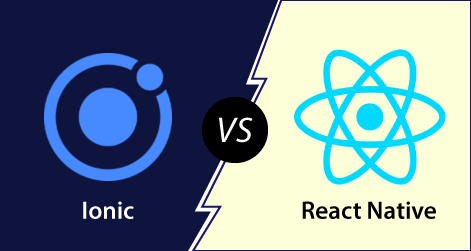Difference between Ionic and React NativeIonic and React Native are the two most common framework to develop mobile apps. Both frameworks have a large community of passionate developers and are used in large enterprises. In this section, we are going to see how Ionic is different from React Native. IonicIonic is an open-source UI toolkit for building performant, high-quality mobile apps, desktop apps, and progressive web apps using web technologies such as HTML, CSS, and JavaScript. It allows developers to build once and run everywhere. It was created by Max Lynch, Ben Sperry, and Adam Bradley of Drifty Co. in 2013. The first beta version of the Ionic framework was released in March 2014. The Ionic framework mainly focuses on front-end user experience or UI interaction, which handles all the look and feel of your app. It is easy to learn and can integrate with other libraries or frameworks such as Angular, React, Cordova, etc. Officially, the Ionic framework has integration with Angular, but it also provides support for Vue.js and React.js. Advantages of Ionic The advantages of the Ionic application are as follows: 1. Easy to learn If the developer has a basic knowledge of CSS, HTML, or JavaScript frameworks, then learning and developing apps using the Ionic framework is very easy. 2. Easy documentation Ionic provides simple, easy, and well-structured documentation. The official documentation covered most of the things required for the developers. 3. Cross-platform The ionic application can deploy on multiple platforms such as iOS, Android, Desktop, and the web, all with one codebase. The ionic applications can write once and runs everywhere. 4. User Interface The user interface of Ionic, such as themes and components are highly customizable. The ionic platform allows its components to adapt to the platform on which the application is running. Disadvantages of Ionic The disadvantages of Ionic application are as follows: 1. Performance The performance of the Ionic application is not as good as compared to native mobile applications. However, the performance gap is not noticeable for most of the average users. 2. Security The app developed with the Ionic framework may not provide as much security as a native application. For example, if you are developing a financial app, e.g., the app for a bank, the Ionic framework is not recommended. 3. Limited native functionality Some native functions may not be available in the Ionic framework. In such a case, you need to develop the plugin to fulfill that function yourself. However, there are many plugins available to cover most of the native functionalities. 4. Not good for video game Ionic framework is not perfect for high-end graphics-dependent applications or video games. 5. Early adopter risk Ionic technology is still in development. It regularly keeps changing its support and standard, and its libraries can be completely rewritten at any time. React NativeReact Native is an open-source JavaScript framework used for developing a mobile application for iOS, Android, and Windows. It is used to build a cross-platform mobile app by using JavaScript. React Native is the same as React, but it uses native components instead of using web components as building blocks. It targets mobile platforms rather than the browser. The Facebook community develops the React Native in 2013 for its internal project Hackathon. In March 2015, Facebook announced that React Native is open source and available on GitHub. Advantages of React Native The advantages of React Native for building mobile applications are given below: Cross-Platform Usage: It provides the facility to "Build once and run everywhere." It can develop apps for Android, iOS, and Windows platforms. Performance: The code written in React Native is compiled into native code, which enables it for all operating systems to provide closer native appearance and functions in the same way on all platforms. Community: React Native provides a large community of passionate developers who helps us to find any answer we require. Hot Reloading: Making a few changes in your app's code immediately visible during development. If the business logic is changed, its reflection is live reloaded on screen. Improving with Time: Some features of iOS and Android are still not supported, and the community is always inventing the best practices. Disadvantages of React Native The disadvantages of React Native for building mobile applications are given below: React Native is still new and immature: React Native is a new framework in Android and iOS programming languages. It is still in the development stage, which can have a negative impact on the apps. Learning is tough: React Native is not easy to learn, especially for a fresher in the app development field. It Lacks the Security Robustness: React Native is an open-source framework, which creates a gap in the security robustness. When you are creating banking and financial apps where data is highly confidential, experts advise not to choose React Native. It Takes More Time to Initialize: React Native takes a lot of time for initializing the runtime even if you are using the hi-tech gadgets and devices. Existence is Uncertain: As Facebook develop this framework, its presence is uncertain since it keeps all the rights to kill off the project anytime. As the popularity of React Native rises, it is unlikely to happen. Ionic vs. React Native
Next TopicIonic vs Cordova
|
 For Videos Join Our Youtube Channel: Join Now
For Videos Join Our Youtube Channel: Join Now
Feedback
- Send your Feedback to [email protected]
Help Others, Please Share










